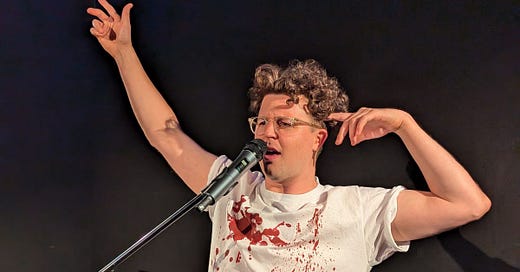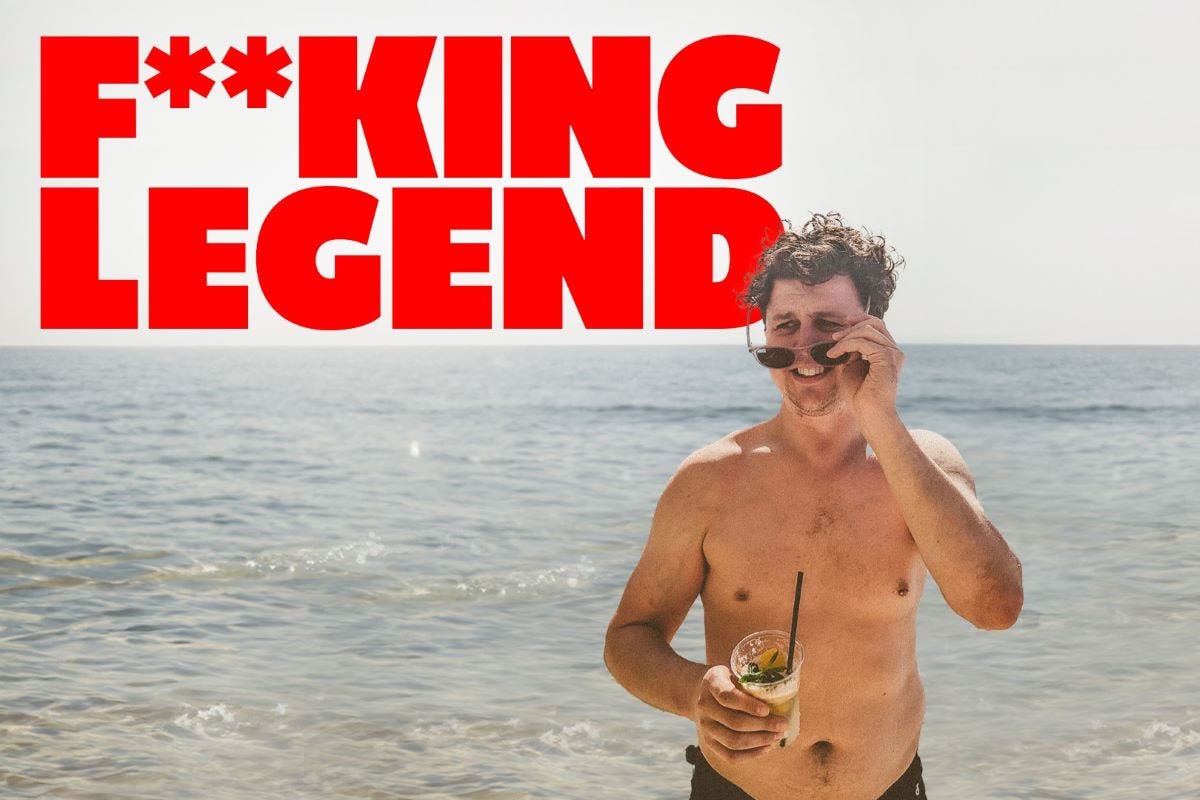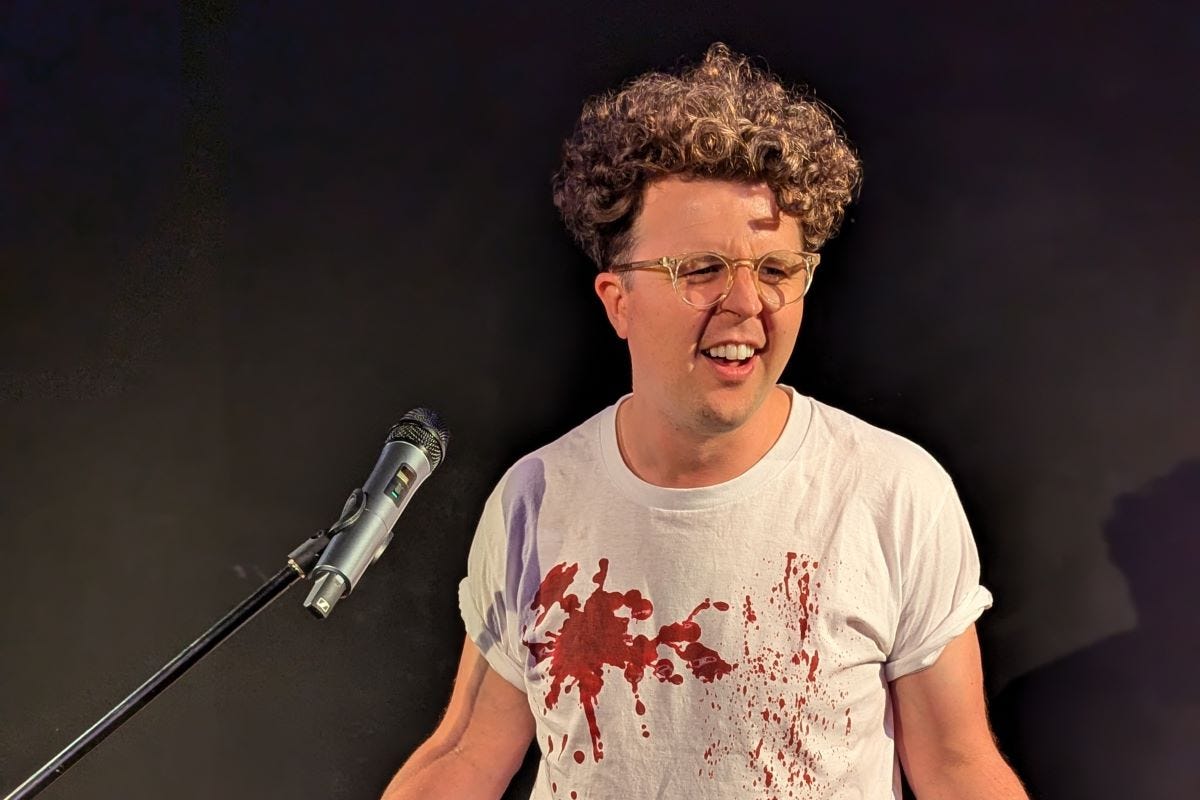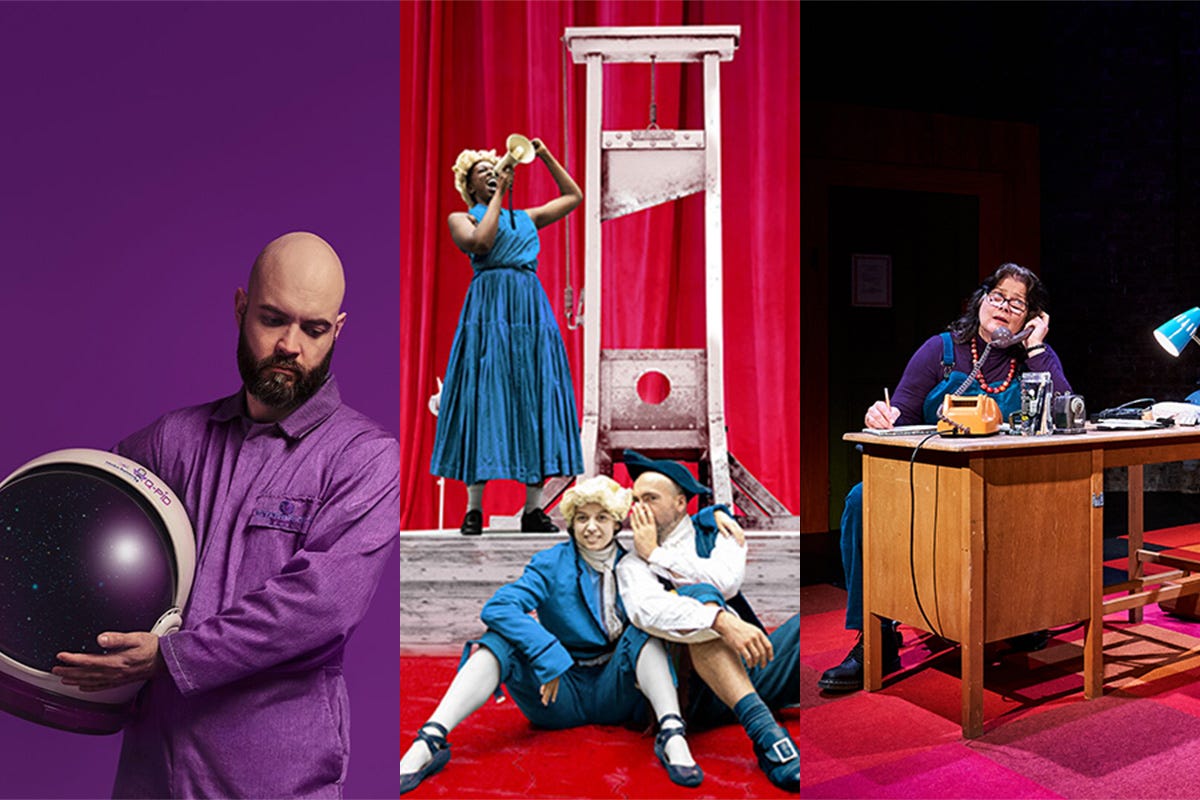"It's sort of like Peep Show meets Mad Max"
Theatremaker Olly Hawes on his provocative solo show F**king Legend, which runs at Riverside Studios until Christmas. Plus: three shows to see next week.
Hello, and welcome to The Crush Bar, a newsletter about theatre written by Fergus Morgan.
This is the free, Friday issue, which usually contains a Q&A with an exciting theatremaker or an essay on a theatre-related topic. This week, there is an interview with Olly Hawes, whose solo show F**king Legend opens at Riverside Studios on Wednesday, then does a dozen or so more sporadic dates until Christmas. After that, there are your three show recommendations.
In case you missed it, here is Tuesday’s issue of Shouts And Murmurs, which is a weekly round-up of the most interesting reviews, interviews and articles on theatre elsewhere…
You can get Shouts And Murmurs straight in your inbox every week by signing up as a paid supporter of The Crush Bar for £5/month or £50/year. If you don’t feel like paying but still want to get the newsletter, then just reply to this email saying so, and I will make that happen.
There are a couple more things you can do to support this newsletter: you can share it with anyone you think might enjoy it and encourage them to subscribe, and you can use it for promotional purposes. There is more info about that here. Right, on with the issue.
Theatremaker Olly Hawes was responsible for the most interesting, most unnerving hours I spent at the Edinburgh Fringe in August.
His solo show F**king Legend, which ran at Pleasance Courtyard in August and is now transferring to Riverside Studios, is, on the surface, a simple story about an annoying, ironic man misbehaving on a stag-do. Hawes weaves layers and layers of meta-theatricality and meaning through it, though, until it becomes a much bigger story about modern masculinity, the damage it does to society, and the cognitive dissonance we exercise to ignore that. Then, in an extraordinary, exhilarating coda, the story catapults a hundred years into the future, imagining an apocalyptic world that Hawes’ protagonist has helped bring about with his facile fecklessness.
Someone - Michael Billington, maybe - once described the relationship between the warring protagonists of Sarah Kane’s Blasted and the civil war raging outside their hotel room as the acorn and the tree: one leads to the other*. Olly Hawes’ F**king Legend joins dots in the same way. It is, I wrote in my four-star review for The Scotsman, “a terrifically smart and discomforting hour.” I can’t recommend it enough.
I really liked F**king Legend when I saw it in August. I found it formally interesting and profoundly disturbing at the same time. Where did it come from?
I had read Noah Yuval Harari’s books Sapiens and Homo Deus, and I wanted to bring together two ideas. One was the perfidious influence of modern masculinity on the world. The other was the direction that late capitalism is heading in, which is a group of wealthy, elite people living forever and everyone else sifting around in the dirt. These things seem obvious to me. They occupy my mind all the time.
You definitely join the dots between those two things, but you do so through the story of a guy going on a stag-do, taking drugs, and cheating on his girlfriend.
It felt like a stag-do was a fantastic crucible to explore all these things. Stag-dos are a quintessential part of modern masculinity. They have become these incredibly opulent, indulgent things. A group of men take a flight, pump a load of carbon into the air, behave badly, fuck off locals, and go back to their lives again. I’ve been on a lot of stag-dos. I’ve never done what the character in F**king Legend does, though.
I had these ambitious ideas, but I knew that if it was ever going to get made, it had to be a one-person show. I thought that actually worked quite well, though, because it made it all about solipsism and narcissism. It is all about him. It is all about the voices in his head. It is sort of like Peep Show meets Mad Max.
Towards the end, the story changes. It jumps forward a hundred years into the future. Your character goes on another trip through an apocalyptic world.
I wanted to push the ideas I was playing with to their logical endpoint. I was originally going to have a third section, set a million years in the future, that was going to involve an interpretative dance. I am not an interpretative dancer, though.
You also play around with irony and meta-theatricality. Why did you layer that in?
If you do something ironically, but you still do it, does that make it better? Probably not. I wanted to explore that cognitive dissonance. To exist in a late capitalist society, we are incredible at exercising cognitive dissonance. We do it to an absurd degree. We do it just to get through the day. If I walked out onto the street right now, there is so much poverty and awfulness. There are really terrible things going on in the world. You just have to blur your mind to that. We just put a podcast in when we go to sleep to distract ourselves from it. We all know what is happening. We all know what we are doing. We keep going, though, and tell ourselves we are powerless. I wanted to find a story in that.
Tell me a bit more about yourself.
I grew up in the home counties. I did a drama degree at Exeter, with lots of people who work in the industry and are household names now. At uni, I loved the work of Forced Entertainment, Sarah Kane, Martin Crimp, and Tim Crouch. I wanted to make work like that. After I graduated, though, I did a show with the National Youth Theatre and signed with a big agency. I spent eighteen months trying to be an actor and not getting anywhere. I was thoroughly humiliated. I tried to become a director. I assisted at the Young Vic and the Bush. I directed a few shows.
I never really felt like I was being my true artistic self, though, so, about ten years ago, I made a show called Do People Make Love In The Same Way They Dance (And Other Mysteries) and took it to the Fringe. I did it in a portacabin by Zoo Southside.
What was that show about?
It was a permanent exhibition thing, and there was only room for ten people in the audience at a time. It was about trying to find love in an infinite universe. It was full of dancing. I wrote facts about the universe all over my body. By the end, I was almost entirely naked and I’d poured coffee all over myself. I’d ask someone in the audience to come and dance with me. I’d just broken up with someone at the time, someone who I then got back together with and subsequently married and is now in the next room. I realised I was interested in manifesting my ideas in work that exists on that boundary between theatre and live art.
In 2016, you made a show called The Absolute Truth About Absolutely Everything, which premiered at Camden People’s Theatre’s Calm Down Dear festival, and which involved a different, unprepared female performer each night reading out monologues you had written, then playing strange games with you.
With The Absolute Truth About Absolutely Everything, I was basically playing with the idea of being a dick, like I am in F**king Legend. Is it me being a dick? Or am I playing with the idea of being and making you watch it? Is that worse?
I was really scarred by that show, though. I think the writing was good and the form was super interesting, and a lot of people I respect thought it was interesting, too. I know the show was difficult for people to watch, though, and I found it hard when it made a lot of people angry and upset. People avoided me in the bar afterwards. Exeunt published an absolutely scathing review of it. I was pretty heartbroken. I basically gave up making shows after that, although Covid and having two children had something to do with that as well.
You set up a company with the theatremaker Nick Cassenbaum, too.
It’s called Take Stock Exchange. Nick and I went to university together. I directed the first thing he ever wrote. We wanted to make work together. We have a social conscience. We thought we would probably be able to get funding making community work. That was ten or eleven years ago. We basically partner with theatres and use storytelling to bring communities together. The idea is to allow people who share the same geographical area but don’t necessarily interact to connect with each other through stories. We did one in Hackney Wick, for example, where there are four or five different community groups – including a young artistic community and an old, white, working-class community – sharing the same area, but who all have very different experiences.
Right now, we are working with the Royal Court on a project called Machloket in response to that show Jews. In Their Own Words, which was actually Jews who are between 40 and 60 and live in Hampstead in their own words. We are doing a proper community project, working with thirty Jewish community groups across the UK, from a golf club to a queer Talmud study group. We ask them to articulate what being Jewish means to them, and to listen to each other’s answers. We want to address the empathy deficit that exists. We believe in trickle-down empathy.
How do you make it all work financially?
To be honest, I was fairly mentally ill from the age of 15 to the age of 30, and I think that was connected to pursuing this absurd dream of success in an industry that is really hard to succeed in, while also trying to find an authentic artistic voice. I just couldn’t do it. Now, I have other flexible work that gives me financial security. I am a private tutor and I run a small team of private tutors, which I felt conflicted about in the past, but now do not. That work allows me to make work on my own terms. It means I get to make stuff that is an authentic reflection of me. If people pay attention, then great. If they don’t, then that doesn’t bother me as much. And I am at peace with that way of making work.
F**king Legend is at Riverside Studios until December 21. For more information, click here.
*I have just learned that this was Kane herself, describing her inspiration for Blasted, in an interview with Aleks Sierz. She was writing a play about two people in a hotel room while watching the siege of Srebrenica on television in the early 1990s.
Three shows to see next week
Distant Memories Of The Near Future - Arcola Theatre, until November 30
I saw David Head’s multimedia storytelling show at the Edinburgh Fringe in 2023 and loved it. Over an hour, Head tells several loosely linked love stories set in a provocatively plausible near future in which romantic relationships have been coded and commodified by tech corporations. It is, I wrote in my four-star review for The Stage, “a gently disquieting thought experiment of a show.” Now, it runs at the Arcola Theatre for three weeks, and you can get tickets via the button below.
The Glorious French Revolution (Or: Why Sometimes It Takes A Guillotine To Get Anything Done) - New Diorama Theatre, until December 14
YesYesNoNo is the alias of theatremaking duo Sam Ward and Rhian Davies, who featured in this newsletter two years ago, and who are responsible for the playful and provocative fringe shows Five Encounters On A Site Called Craigslist, [insert slogan here], the accident did not take place, we were promised honey!, and Nation. Now, YesYesNoNo is making its biggest show yet, featuring five actors telling the story of the French Revolution. It is, the blurb states, “a completely one-sided, biased, irreverent account of what it feels like to crave a guillotine today.” It runs at the New Diorama Theatre until mid-December. You can get tickets via the button below.
The Brenda Line - Traverse Theatre, until November 16
In the 1970s and 1980s, the Samaritans, enacting their policy of never hanging up on anyone, operated a system whereby men could ring up, ask for ‘Brenda’, and relate their sexual fantasies to a women on the other end of the phone. Harry Mould’s debut - inspired by her mother’s experiences volunteering in North Wales - focuses on two women doing that job. It ran in Pitlochry in August and now transfers to the Traverse Theatre for five performances. You can get tickets via the button below.
As you are no doubt bored of hearing, I’ve made a podcast called A History Of Scottish Drama In Six Plays. Episodes are being released on Mondays. There is more info about it here, and you can now listen to episode two wherever you get your podcasts…
That’s all for this issue
That is it for this week. If you want to get in touch about anything raised in this issue - or anything at all, really - just reply to this newsletter or email me at fergusmorgan@hotmail.co.uk. Or you can find me on Twitter/X, where I am @FergusMorgan.
A quick reminder of the ways you can support The Crush Bar. You can share it. You can use it for promotional purposes. And you can become a paid supporter, which means you get an extra weekly email, Shouts and Murmurs, every Tuesday. There are currently 3433 subscribers, 107 of whom are paid supporters. If you would like to join them, you can do so above.
Fergus







